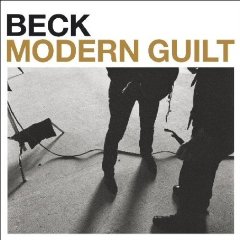At a party recently a Canadian friend was articulating his horror upon hearing that Beck Hansen, once the epitome of post-modern cool, had joined Tom Cruise and John Travolta in Los Angeles’ elite band of shiny, happy slebs, the scientologists. ‘It’s fucked’ he boomed. ‘I mean, Jason Lee I can take. But Beck? Jeez!’
Beck outed himself as a scientologist in 2005, but in truth has been associated with the cult since his childhood. His father David Campbell was a Celebrity Magazine pin-up during the 70s and Beck actually lived at the Celebrity Centre in Los Angeles when he was a teenager. He married Marissa Ribisi – and her out of Dazed and Confused – who is also a second generation scientologist, in 2004.
On Modern Guilt, it seems that the paranoia that infects Hubbard’s clan might be getting to him. A flick through the CD booklet, in which the lyrics are printed in capitals, is like reading graffiti scratched onto the walls of a manic depressive unit. Throughout, people are caged, clambering out of bottomless pits and cast out into unknown voids. Beck refers to himself repeatedly as ‘stranded’, looking on helplessly as the world around him falls apart. He always seemed slightly disconnected, but here he is isolated; the line has been cut between himself and civilisation. “And he’s helpless / And forgetting / In the background / Saying nothing”, he sings on ‘Youthless’.
Chemtrails ventures into the realm of the conspiracy theory, the title referring to the theory that the white contrails that aircraft excrete into the atmosphere are actually chemicals that are purposefully pumped out for a variety of reasons that range from combating global warming, to drugging entire populations. The song is an almost identical (and most probably intentional) homage to ‘The Four Horsemen’ by the cult Greek psychedelic group Aphrodite’s Child (found on their classic album 666). Both prophesise Armageddon, yet while Aphrodite’s song is virile, a Dionysian soundtrack to a biblical apocalypse, Beck is in no mood to party. In fact you can imagine the former hipster watching the sky from his air conditioned apartment in LA alone, paranoid, the television switched to 24 hour news in the corner of the room. He sounds spaced out, paralysed by fear. “The chemtrails is where we belong / That’s where we’ll be when we die in the slipstream / We’ll climb in a hole in the sky”, he sings.
Danger Mouse manages to channel Beck’s up-tempo oeuvre quite well. His calling cards are still there – the funk breaks, the hip krautrock pastiches – but after a while the contrast between lyrical and sonic content is so disparate the effect is ludicrous. “Don’t know what I’ve done but I feel afraid” he sings in his nonchalant way over the Motown stomp of ‘Modern Guilt’.
It’s hard to swallow because Beck in his pomp made concepts such as guilt an outdated philosophy. He was the hybrid kicking up the dust of grunge and mashing it with hip hop, Americana, country, Latin, electro, disco. He was unattached, schizoid, flowing through the rhizomes of late 20th century music, hurtling into the next. Odelay, co-produced by the Dust Brothers, was his magnum opus, ditching the slacker character he had created for his first hit, 1993’s ‘Loser’, and restyling himself as the indifferent crooner at the centre of a spiraling universe. Beck sounded so sure against the relentlessly shifting sonic landscape he had created. His lyrics were random, nonsensical, but he delivered them with a knowingness that grounded them. They seemed to say, ‘Sure, I don’t know what I’m talking about, but neither do you’. To me, a 12 year old in a country whose closest comparison to Beck was Mike Flowers, it was an epiphany.
Yet, looking back, Beck was never too far away from Flowers’ retro pastiche. (Watch the videos to ‘Wonderwall’ and ‘New Pollution’ on YouTube back to back and you will realise how fine the line really was at times). Woven through his career is a heavy dose of kitsch. The cartoon slacker of ‘Loser’, the Prince-inspired funkster circa Midnight Vultures, were tongue in cheek comedic devices. The novelist Milan Kundera linked kitsch with control. It was a way of compromising the loss of freedoms by complying with enforced, happy emotions. In a way, Scientology is the cult of kitsch.
Beck might have rid himself of the Thetans but he just can’t get rid of the cool, hip soundtrack. If he wants to get all Kafka on us he should ditch the retro dance pastiche and make something truly dark. Until then he can simply strum his guitar and moan his moan in the Celebrity Centre as loud as he wants – as long he plays those nice dancy tunes at the Scientology parties he’ll be quite all right.


